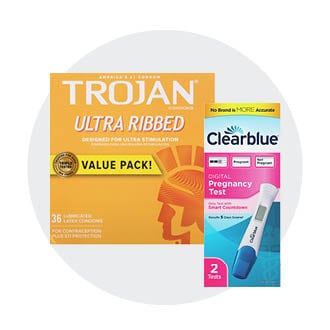Browse for items that are HSA/FSA eligible. Find what you need and add eligible items to your list. Go in-store to purchase these items with your HSA/FSA card!
Eligible Products
The IRS determines which health care services and products are eligible for purchase using an HSA or FSA. Please check with your plan administrator to verify items designated as HSA or FSA eligible are reimbursable. Eligible Items include over the counter products that treat a specific medical condition and are primarily for a medical purpose, such as medicines or products that diagnose, alleviate or treat existing or imminent injuries, illnesses or medical conditions. Many of these products are for short term use but some may treat chronic medical conditions.
Common Categories include:
What is an HSA?
A health savings account (HSA) allows you to set aside pre-tax money to use on qualifying medical expenses. Each year, you can set aside up to $4,150 per individual or $8,300 per family to help lower your overall healthcare costs. Contributions can come from you, your employer or anyone else wishing to add to your account. In many cases, you'll receive a debit card to use to pay for qualifying expenses. For out-of-pocket payments, you can request reimbursements from your plan administrator. To receive reimbursements, remember to keep receipts and paperwork in accordance with your plan's policies. To qualify for an HSA, you must be enrolled in a high deductible health plan (HDHP). To see if you're eligible for an HSA, check with your company or plan administrator.
What’s the Difference Between HSA and FSA?
Similar to an HSA, a Flexible Spending Account (FSA) also allows you to save pre-tax dollars for medical expenses; however, FSAs are established by your employer and have a limit of up to $2,700 per year. Both accounts can be used to cover medical costs for you and any dependents claimed on your federal tax return.
How Do You Use an HSA or FSA?
In many cases, you’ll receive a debit card which can be used to pay for qualifying expenses. For out of pocket payments, you can request reimbursements from your plan administrator. To receive reimbursements, remember to keep receipts and paperwork in accordance with your plan’s policies.
Dual-Purpose Items
Dual-Purpose items may have both a medical purpose and a personal hygiene, cosmetic or general health purpose. In order for an item to be eligible, it must be used to treat a medical condition and not used to improve or maintain general health unless prescribed by a physician to treat a specific illness, condition or injury. These products may be eligible for reimbursement with a letter from a licensed health care professional stating it’s a medical necessity. Card holders should contact their plan administrator for more information and to confirm the required documentation.
Ineligible Items
Ineligible items are used for general health, cosmetic or personal hygiene purposes. These items are not reimbursable. Typically, these items wouldn’t be referred to as a medicine or drug and wouldn’t be recognized to treat a medical condition. These items include things such as food supplements, toiletries, lotions, soaps, shampoos and most herbal supplements.
Disclaimer: This information is for educational purposes only. The content is from other public sources and is reproduced here for the convenience of consumers. The accuracy of this information is not guaranteed.










